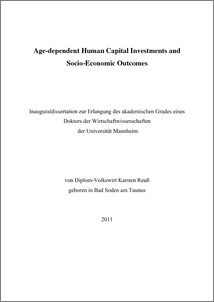|
Age-dependent human capital investments and socio-economic outcomes
Reuß, Karsten
![[img]](https://madoc.bib.uni-mannheim.de/style/images/fileicons/application_pdf.png)  Vorschau |
|
PDF (Dissertation)
DissertationReuss.pdf
- Veröffentlichte Version
Download (1MB)
|
|
URL:
|
https://madoc.bib.uni-mannheim.de/29930
|
|
URN:
|
urn:nbn:de:bsz:180-madoc-299307
|
|
Dokumenttyp:
|
Dissertation
|
|
Erscheinungsjahr:
|
2011
|
|
Ort der Veröffentlichung:
|
Mannheim
|
|
Hochschule:
|
Universität Mannheim
|
|
Gutachter:
|
Franz, Wolfgang
|
|
Datum der mündl. Prüfung:
|
7 Dezember 2011
|
|
Sprache der Veröffentlichung:
|
Englisch
|
|
Einrichtung:
|
Fakultät für Rechtswissenschaft und Volkswirtschaftslehre > VWL (Franz 1997-2013, Em)
|
|
Fachgebiet:
|
330 Wirtschaft
|
|
Normierte Schlagwörter (SWD):
|
Bildung , Intelligenzleistung , Persönlichkeit , Simulation , Lebenszyklus <Wirtschaft> , Ungleichheit
|
|
Freie Schlagwörter (Englisch):
|
cognitive skills , noncognitive skills , education , inequality , human capital , life cycle
|
|
Abstract:
|
This dissertation studies determinants and consequences of human capital formation over the life cycle, starting in infancy.
It consists of two main parts.
In the first part a simulation model of life cycle skill formation is developed that investigates the relationship between investments in human capital and its labor markets outcomes as well as the resulting distribution of earnings in the population. The model is calibrated to investigate long run consequences of counterfactual human capital investment strategies into people in Germany and Europe.
The second part employs ordinary least squares regression, cluster and factor analysis to study skill formation based on samples taken from the longitudinal Mannheim Study of Children at Risk. The results indicate a significant impact of parental investments on cognitive and mental skills that is decreasing over time. Thus, the inequality of parental investment starting in infancy (and earlier) has long run consequences for human capital formation. Implications for educational policies from an economic point of view are discussed.
|
 | Dieser Eintrag ist Teil der Universitätsbibliographie. |
 | Das Dokument wird vom Publikationsserver der Universitätsbibliothek Mannheim bereitgestellt. |
 Suche Autoren in Suche Autoren in
Sie haben einen Fehler gefunden? Teilen Sie uns Ihren Korrekturwunsch bitte hier mit: E-Mail
Actions (login required)
 |
Eintrag anzeigen |
|
|
